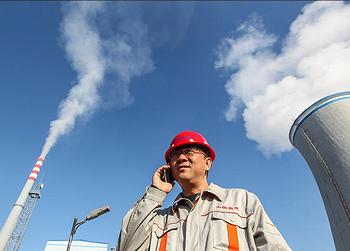
BEIJING, China, December 20, 2017 (ENS) – China has announced plans to establish the world’s largest emissions trading system, covering more than 1,700 power companies and three billion tonnes in total greenhouse gas emissions.
The market will be set up to “control and reduce greenhouse gas emissions and promote green low-carbon development,” said National Development and Reform Commission Deputy Director Zhang Yong at a press conference Tuesday in Beijing.

Trading will begin after a period of “preparatory work” and will “gradually expand market coverage” to include “other high-energy-consuming and high-emission industries,” said Li Gao, director of the NDRC’s Climate Department.
China has set up pilot emissions trading systems in seven provinces and cities; the first was established in 2013.
China’s State Council approved the national emissions trading system was approved last week.
“China joins a growing number of jurisdictions, such as California, the EU and South Korea, which are using market-based measures to cut climate emissions in a cost-effective and efficient way,” said Dirk Forrister, president and CEO of the International Emissions Trading Association, IETA, a nonprofit business organization based in London.
“China will have the world’s largest carbon market, drawing lessons from these other markets to ensure that it works in harmony with other national policies. We commend the Chinese government for taking these steps to realize its long-term vision,” said Forrister.
In its latest Emissions Trading System Status Report, the International Carbon Action Partnership estimated that close to half of the world’s GDP would be subject to an emissions trading market by the end of 2017.

“IETA and its members are keenly watching the development of the Chinese ETS, and support the move by the government to cut pollution in China and transition to a low-carbon economy,” says Min Li, IETA’s China representative. “We stand ready to help businesses find opportunities and address challenges in this exciting new era for Chinese climate policy.”
Around the world, 42 national and 25 subnational jurisdictions are pricing carbon.
The European Union Emissions Trading System, currently the largest carbon market, covers about 1.75 billion tonnes of carbon emissions.
Leaders across the Americas earlier this month pledged to step up the use of carbon pricing as a key instrument of economic and environmental policy to reduce carbon emissions.
The initiative, announced December 12 at the One Planet Summit in Paris, will apply a cost of carbon to guide public investment decisions and encourage private companies to do the same through internal carbon pricing.
Canada, Chile, Colombia, Costa Rica, and Mexico, as well as the governors of the U.S. states of California and Washington and the premiers of the Canadian provinces of Alberta, British Columbia, Nova Scotia, Ontario and Quebec, came together to launch the new Carbon Pricing in the Americas cooperative framework.
Reaffirming their support for the Paris Climate Change Agreement as a necessary step towards fighting climate change, the leaders have agreed to collaborate to strengthen systems for measurement, reporting, and verification of greenhouse gas emissions and emissions reductions.
A substantial reduction in carbon emissions is essential to achieve the central goal of the Paris Agreement, which is to limit the rise of global average temperatures to well below 2 degrees Celsius and as close as possible to 1.5 degrees, relative to pre-industrial levels.
The newly launched initiative will implement carbon pricing as a central economic and environmental policy instrument for ambitious climate change action.
It will create the platform for cooperation on Carbon Pricing in the Americas, CPA, among jurisdictions, inviting support from the World Bank, the Partnership for the Market Readiness and other partners, institutions and organizations.
The CPA participants will identify and work in opportunities to increase alignment of carbon pricing systems and promote carbon markets, in order to maximize climate action while ensuring progress on reducing greenhouse gas emissions.
Participants say they will collaborate to strengthen systems for measurement, reporting, and verification of greenhouse gas emissions and emissions reductions as a necessary foundation for the coordination of carbon markets within the Americas.
They expressed the intention to explore the development of common standards to ensure the environmental integrity of international carbon pricing mechanisms.
Finally, CPA participants intend to strengthen international and regional collaboration and cooperation to share lessons in carbon emissions reductions and improve the technical capacity of the public and private sector.
Copyright Environment News Service (ENS) 2017. All rights reserved.
© 2017, Environment News Service. All rights reserved. Content may be quoted only with proper attribution and a direct link to the original article. Full reproduction is prohibited.
